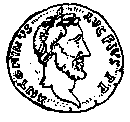
REAL HISTORY
Antoninus Pius (86 AD - 161 AD)
|
|
In ancient times the
ruler of the Roman Empire was an extremely powerful person. Everyone tried to
win his friendship, and it was hard for whoever was emperor at the time not to
have his head turned by flattery, and the excitement of limitless wealth and
power. Fortunately, however, not everyone failed to rise to the challenge.
Antoninus Pius was brought up in the town of Lorium, twelve miles from Rome. His
father died while he was still young, and he spent his childhood with his
grandparents. He grew up to be handsome and kind-hearted, gentle to all, and
loved by everyone who knew him well. Like most wealthy young men of the time he
entered public life, and governed first in Italy, then in Asia.
|
Antoninus was probably a student of the Greek philosopher, Epictetus. He himself said that in Epictetus’ wisdom he found the means to conduct life “with honour to himself and advantage to his country”. |
Soon Emperor
Hadrian noticed his exceptional abilities, and decided to make him his heir. The
post of supreme ruler was not an easy one, but Antoninus accepted it, and
assumed control of the Empire that same year, at the age of fifty-two.
From the first it was clear that the people had finally gained a leader
worthy of them. At the beginning of his reign Antoninus refused to punish the
men whose names were brought to him, saying, “I must not begin my career as
your leader with such deeds”.
|
A leading orator of the day said of Antoninus: “ Antoninus I love, I cherish like the light, like day, like breath, and feel that I am loved by him”. |
He was often heard to say, “he would rather save a single citizen than slay a thousand foes,” and no wars were fought during his twenty-four year reign, save along the borders of the Empire, which were regularly threatened by barbarian tribes. This remarkable achievement made him highly popular with other nations, and brought wealth and security to the one-hundred and fifty million people beneath his rule.
|
Marcus Aurelius spoke with great affection of his adopted father: “There is in him nothing harsh, nor implacable, nor violent; but he examined all things separately, as if he had abundance of time, and without confusion, in an orderly way, vigorously and consistently.” |
Despite the importance of his position, Antoninus remained a frugal, modest man with simple tastes. He reduced the pomp surrounding the emperor to a minimum and continued to live in the same way as he had done when he was a private citizen.
At the age of seventy-five he fell ill and, feeling that death was near, he bestowed his daughter on the young Marcus Aurelius, his adopted son and heir, and gave the Empire into his hands. An official was standing by the bed, waiting to be given the watchword for the day; Antoninus murmured “Equanimity”, then turned, and peacefully passed away.